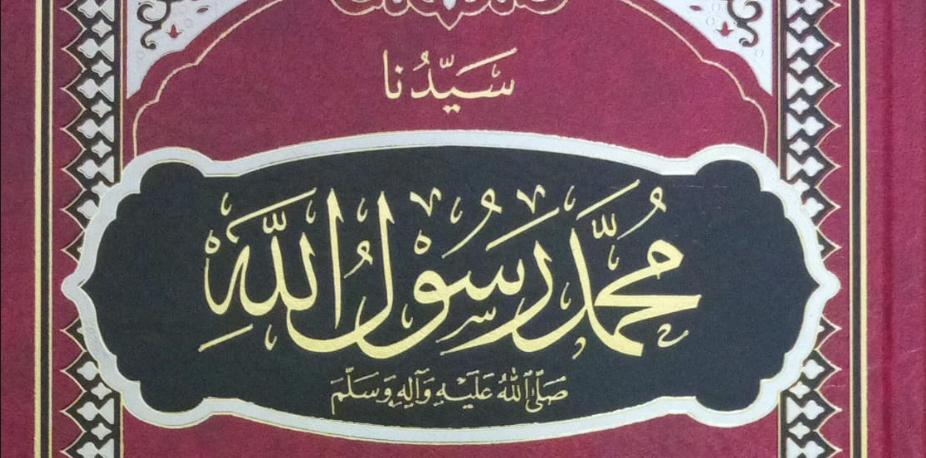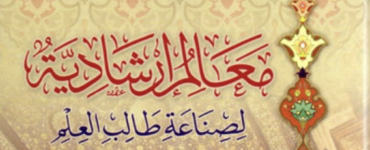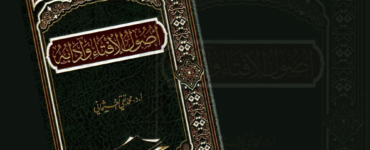The following are excerpts taken from the authored work of Shaykh ‘Abdullāh Sirāj al Dīn, titled, Muḥammad the Messenger of Allāh, Shaykh ‘Abdullāh Sirāj al Dīn. Translated by Mawlana Hudhaifa Karolia.
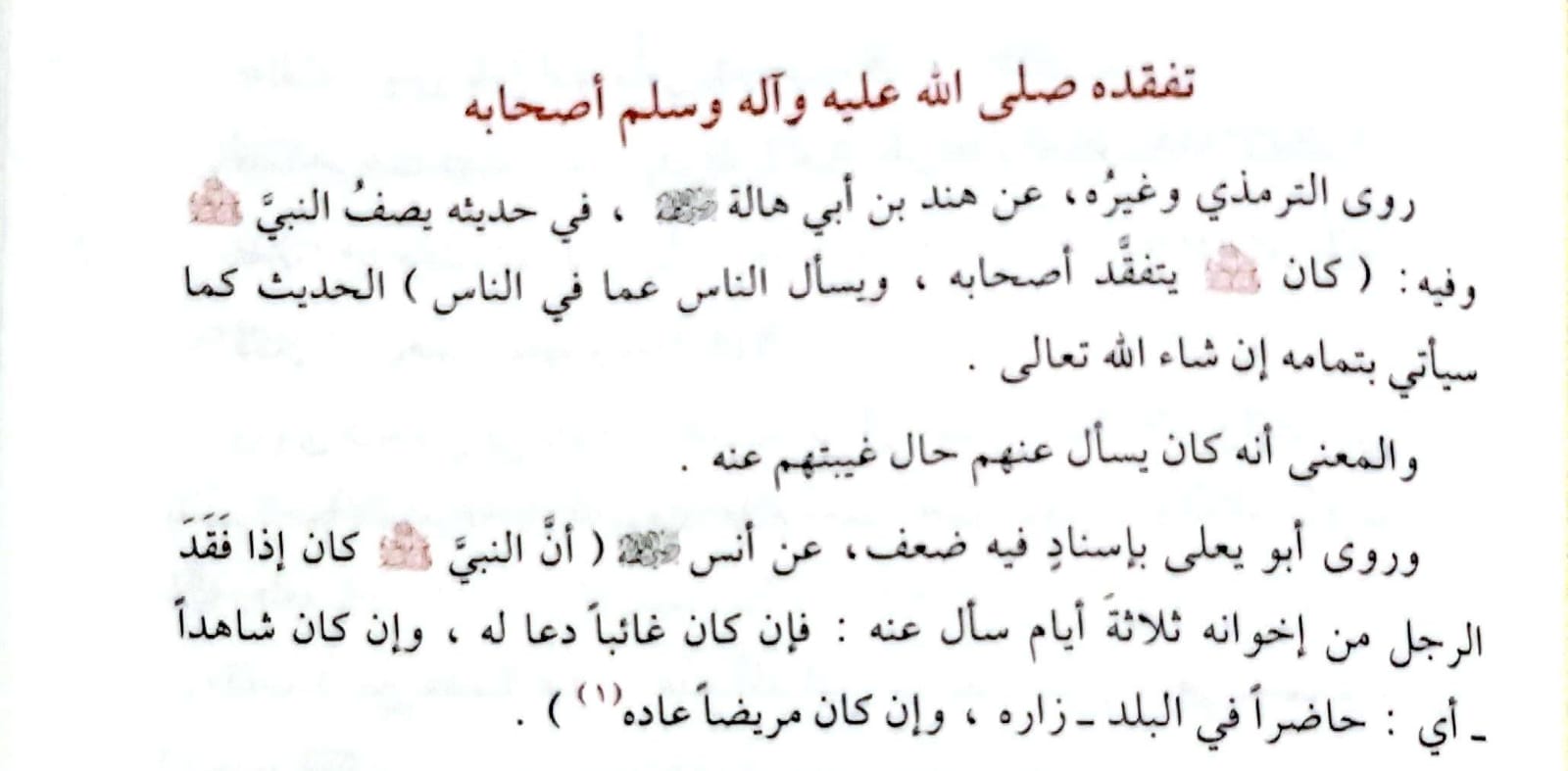
The Messenger of Allāh would seek out his Companions when they were absent.
Imām Tirmidhī (may Allāh have mercy on him) narrates from Hind bin Abī Hālah (may Allāh be pleased with him) his description of the Messenger of Allāh (may Allāh send His salutations and peace upon him), in which he mentions that the Messenger (may Allāh send His salutations and peace upon him) would seek out his companions, and would enquire from others about their condition in their absence.
Abū Ya‘lā (may Allāh have mercy on him) also narrates via a chain containing some weakness from Anas (may Allāh be pleased with him) that when the Messenger of Allāh (may Allāh send His salutations and peace upon him) would notice the absence of any of his Companions for three days, he would enquire about him; if the person was out of town, he (may Allāh send His salutations and peace upon him) would pray to Allāh for him, if he was at home, he (may Allāh send His salutations and peace upon him) would visit him, and if he was ill, he (may Allāh send His salutations and peace upon him) would attend to him.
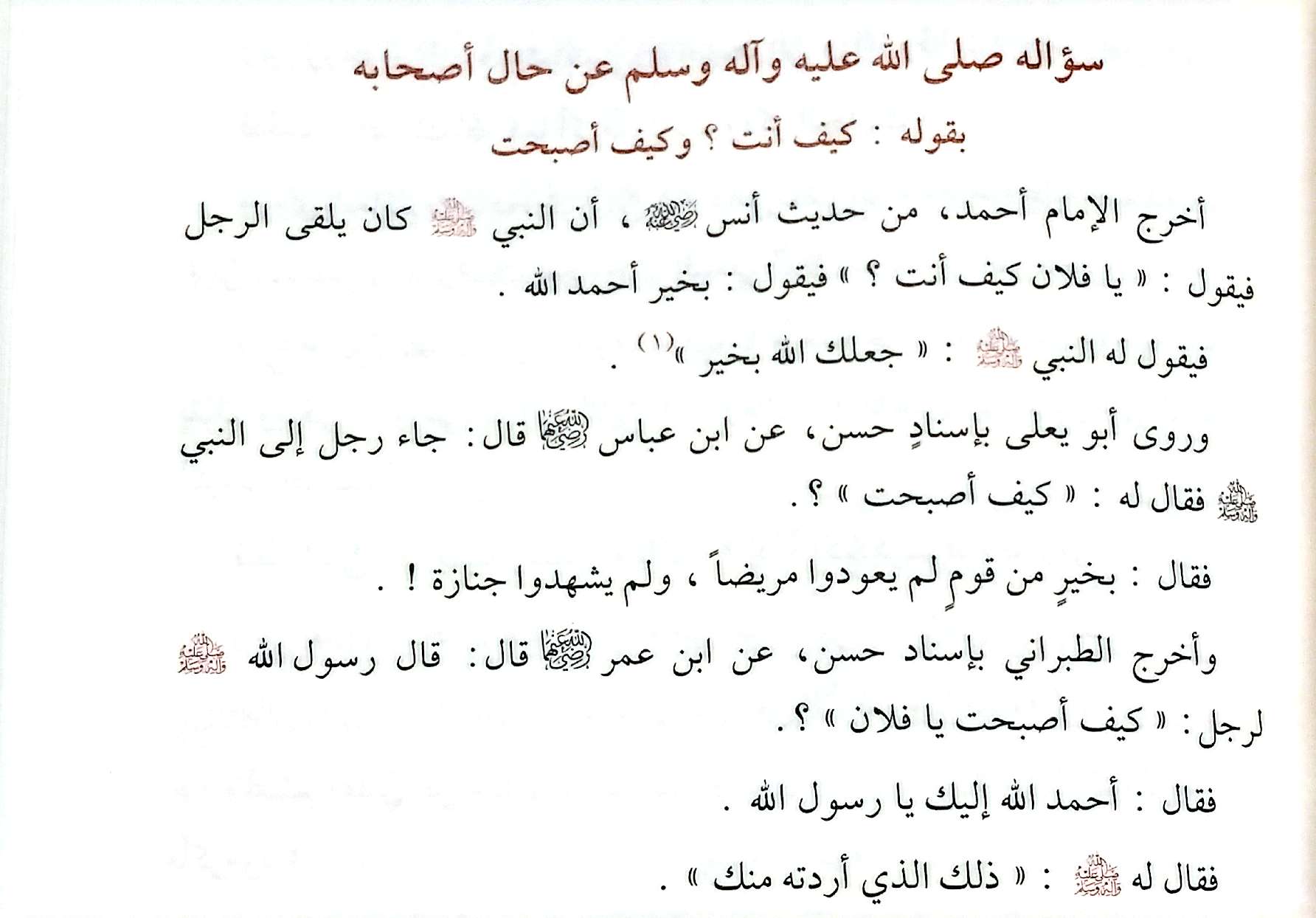 The Messenger of Allāh would enquire about his Companions by asking them, “How are you?”
The Messenger of Allāh would enquire about his Companions by asking them, “How are you?”
Imām Aḥmad bin Ḥanbal (may Allāh have mercy on him) narrates from Anas (may Allāh be pleased with him) that when the Messenger of Allāh (may Allāh send His salutations and peace upon him) would meet someone, he would enquire, “O So-and-so, how are you?”
The person would reply, “I am well, and for that I thank Allāh”.
The Messenger (may Allāh send His salutations and peace upon him) would then respond, “May Allāh keep you well!”
Abū Ya‘lā (may Allāh have mercy on him) also narrates via an acceptable chain from ‘Abdullāh bin ‘Abbās (may Allāh be pleased with them) that a man came to the Messenger of Allāh (may Allāh send His salutations and peace upon him), and so the Messenger (may Allāh send His salutations and peace upon him) asked him, “How’s your morning been?”
He replied, “Well! I am of a people who’ve had no patients to attend to, and no biers to follow”.
Ṭabarānī (may Allāh have mercy on him) also narrates via an acceptable chain from ‘Abdullāh bin ‘Umar (may Allāh be pleased with them) that the Messenger of Allāh (may Allāh send His salutations and peace upon him) asked a man, “How’s your morning been, O So-and-so?”
The man replied, “I have only the praise of Allāh to tell you of, O Messenger of Allāh”.
The Messenger (may Allāh send His salutations and peace upon him) replied, “That’s exactly what I wanted from you!”
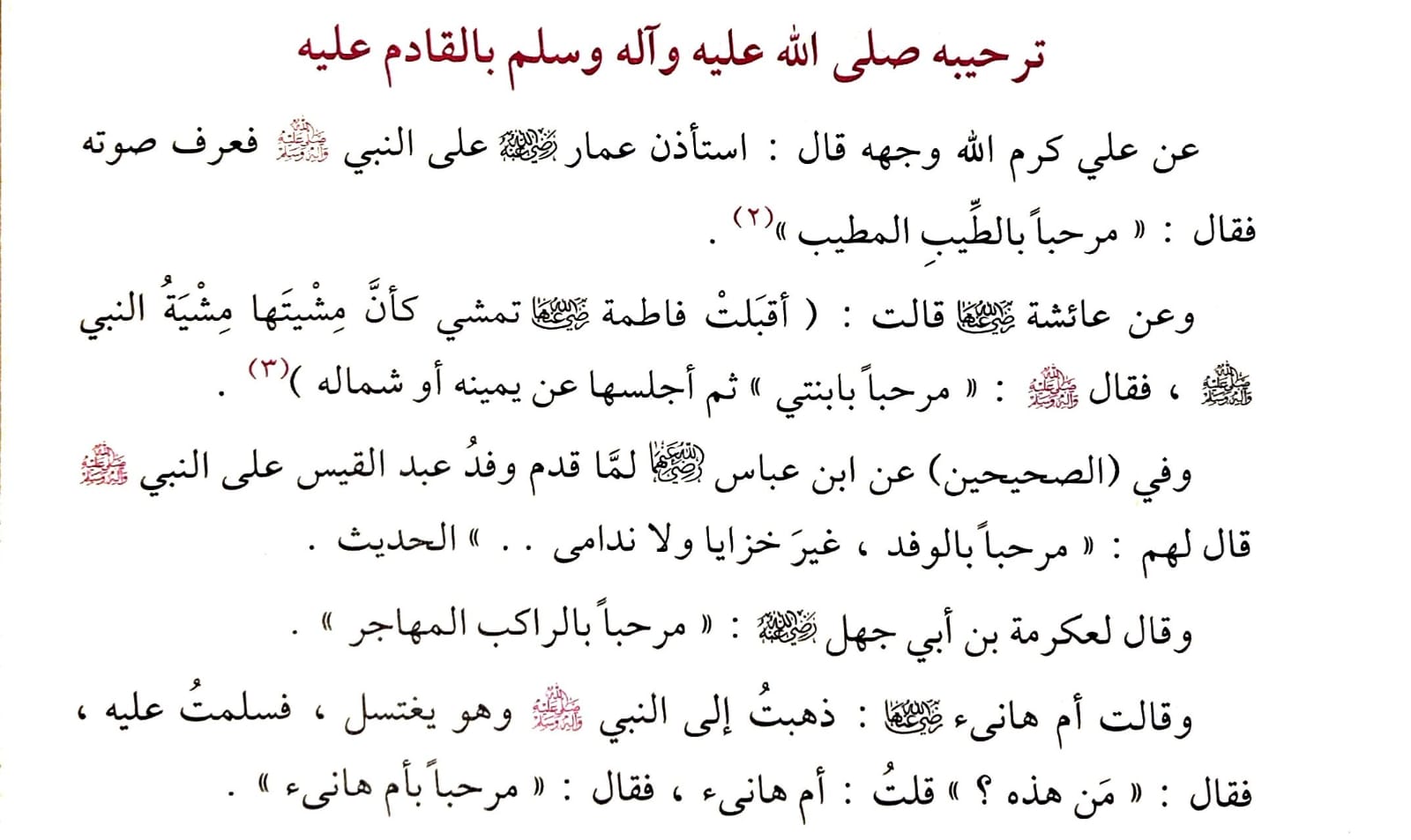
The Messenger of Allāh would welcome those who’d come to him.
‘Alī (may Allāh honour his countenance) says, “‘Ammār (may Allāh be pleased with him) sought permission to enter into the presence of the Messenger (may Allāh send His salutations and peace upon him). The Messenger (may Allāh send His salutations and peace upon him) recognised his voice, and said, “Welcome, O pure and purified one!”
‘Ā’ishah (may Allāh be pleased with her) likewise says, “Fāṭimah (may Allāh be pleased with her) approached, her walk resembling the walk of the Messenger (may Allāh send His salutations and peace upon him). He (may Allāh send His salutations and peace upon him) said, “Welcome to my daughter!” and then made her sit to his right or left.
It is also mentioned in the Ṣaḥīḥayn, on the authority of ‘Abdullāh bin ‘Abbās (may Allāh be pleased with them), that when the delegation of ‘Abd al Qays came to the Messenger (may Allāh send His salutations and peace upon him), he (may Allāh send His salutations and peace upon him) said to them, “Welcome to the delegation who’ve arrived, neither disgracefully nor regretfully!”
The Messenger (may Allāh send His salutations and peace upon him) similarly said to ‘Ikrimah bin Abī Jahl (may Allāh be pleased with him), “Welcome to the riding migrant!”
Umm Hāni’ (may Allāh be pleased with her) likewise narrates that she went to the Messenger (may Allāh send His salutations and peace upon him) who happened to be taking a bath at the time. When she greeted, he (may Allāh send His salutations and peace upon him) enquired, “Who is it?”
“Umm Hāni’,” she replied.
The Messenger (may Allāh send His salutations and peace upon him) said to her, “Welcome O Umm Hāni’”.

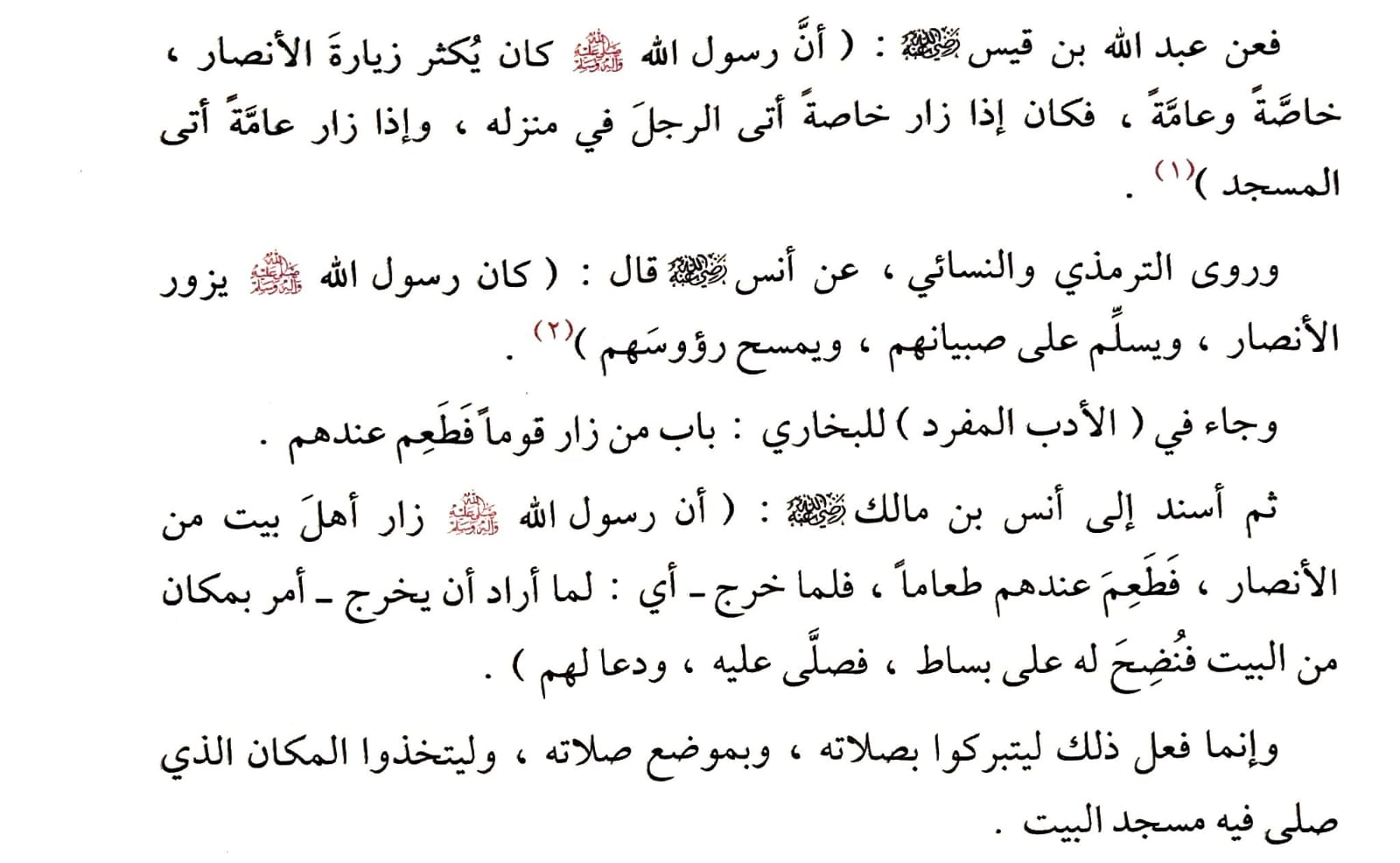
The Messenger of Allāh would visit his Companions.
The Messenger of Allāh (may Allāh send His salutations and peace upon him) would visit his Companions in order to make them feel honoured and happy, and in order to benefit them with his guidance and teachings.
‘Abdullāh bin Qays (may Allāh be pleased with him) relates that the Messenger (may Allāh send His salutations and peace upon him) would visit the Anṣār often, at times individually, and at times in groups. When he (may Allāh send His salutations and peace upon him) wanted to visit an individual, he’d go to their house, and when he wanted to visit a group of people, he’d go to the Masjid.
Imāms Tirmidhī and Nasa’ī (may Allāh have mercy on them) similarly narrate from Anas (may Allāh be pleased with him) that the Messenger (may Allāh send His salutations and peace upon him) would visit the Anṣār, and that he would greet their children and place his hand on their heads.
It likewise appears in Al Adab Al Mufrad of Imām Bukhārī (may Allāh have mercy on him), in the Chapter on Those Who Visit a People and Eat With Them, on the authority of Anas bin Mālik (may Allāh be pleased with him), that the Messenger (may Allāh send His salutations and peace upon him) visited the people of a family among the Anṣār, then ate some food with them. When he (may Allāh send His salutations and peace upon him) intended to leave, he instructed that an area of the house be prepared, and so water was sprinkled for him on a mat. He (may Allāh send His salutations and peace upon him) then performed Ṣalāh on the mat and made du‘ā’ for them.
The only reason he (may Allāh send His salutations and peace upon him) did this was so that they could anticipate the blessings of his Ṣalāh, and of the place in which he’d performed Ṣalāh, and so that they could allot the area in which he’d performed Ṣalāh as the muṣallā of the house.
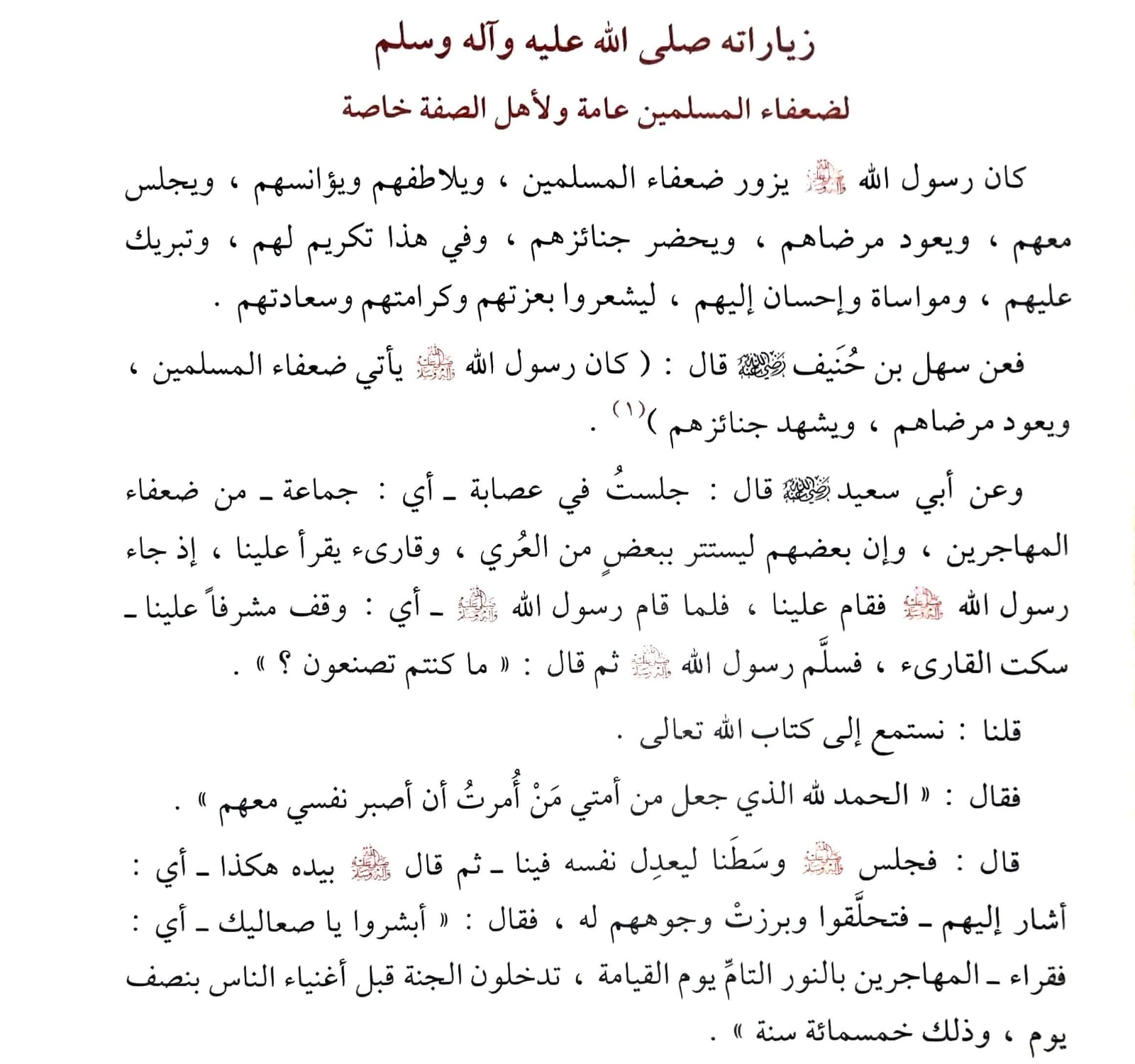
The Messenger of Allāh would visit the indigent believers in general, and the inhabitants of the Platform in particular.
The Messenger of Allāh (may Allāh send His salutations and peace upon him) would visit the indigent believers, and would adopt a sense of amicability and congenialiaty with them. He (may Allāh send His salutations and peace upon him) would sit with them, visit their ill, and attend their funerals. This would be a means of honouring them, of invoking blessings for them, and of extending beneficence and kindness to them, so that they could perceive their lofty status and honour, as well as their great fortune.
Sahl bin Ḥunayf (may Allāh be pleased with him) says, “The Messenger of Allāh (may Allāh send His salutations and peace upon him) would visit the indigent believers, visit their ill, and attend their funerals”.
Abū Sa‘īd (may Allāh be pleased with him) relates, “I was once seated with a group of the indigent migrants, some of whom were hiding behind one another due to their lack of sufficient clothing, while someone recited the Qur’ān.
The Messenger (may Allāh send His salutations and peace upon him) suddenly arrived, and stood there watching us, upon which the one reciting paused his recitation.
The Messenger (may Allāh send His salutations and peace upon him) greeted and asked, “What were you all doing?”
We said, “We were listening to the Speech of Allāh Ta‘ālā”.
He (may Allāh send His salutations and peace upon him) said, “All praise is to He who placed in the my Ummah those whom I’ve been instructed to be patient with!”
He (may Allāh send His salutations and peace upon him) then sat down in the middle of us all and made a sign with his hand, and so everyone formed a circle and turned their faces towards him (may Allāh send His salutations and peace upon him).
He (may Allāh send His salutations and peace upon him) then said, “Glad tidings – O impoverished migrants! – of undiminished luminance on the Day of Resurrection. You will enter Paradise half a day before the wealthy people, and that’s equivalent to five hundred years””.
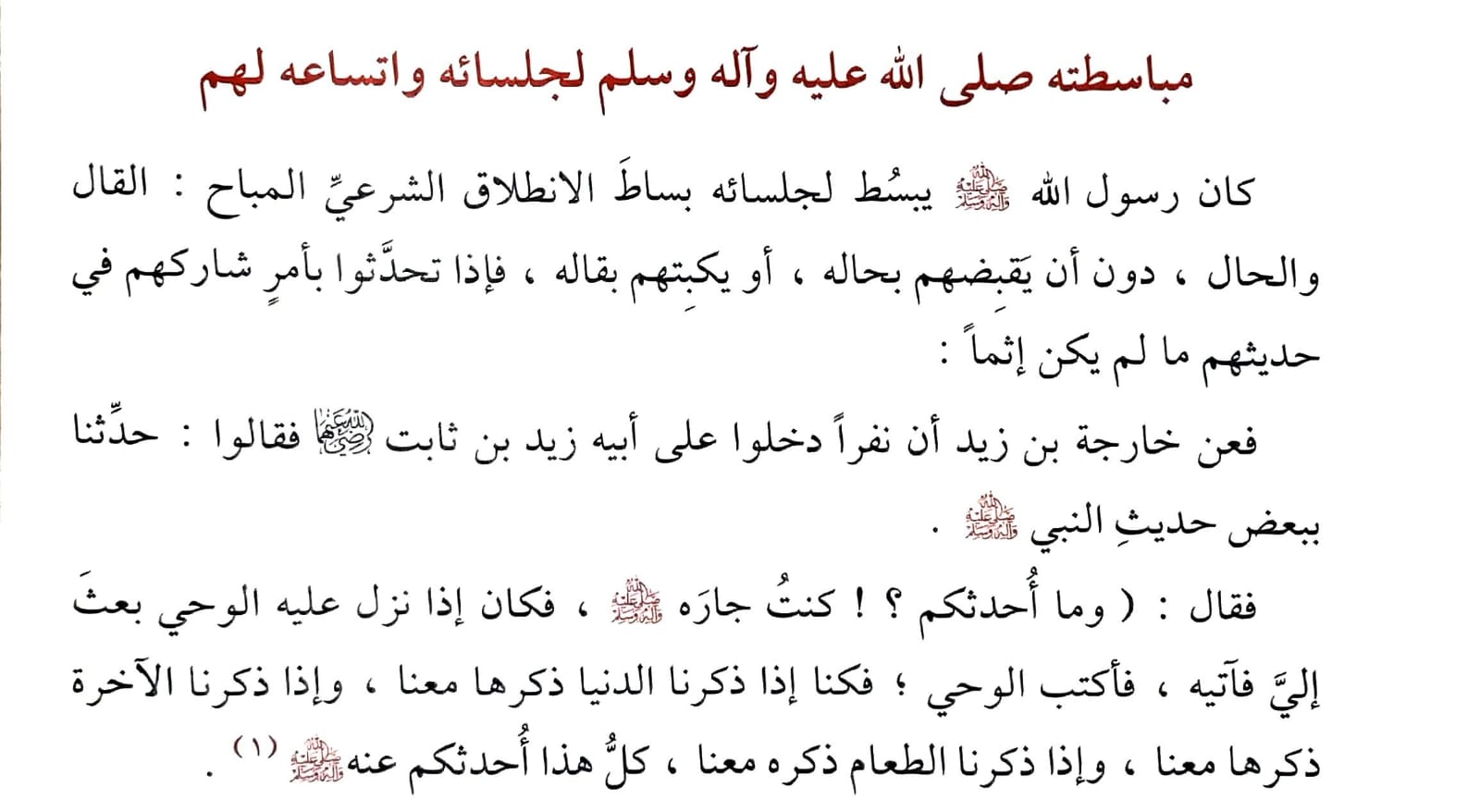
The Messenger of Allāh would converse in a free and friendly manner with his Companions.
The Messenger of Allāh (may Allāh send His salutations and peace upon him) would adopt a free and friendly disposition with his Companions – within the boundaries of what is permitted by Sharī‘ah – in both speech and action. He (may Allāh send His salutations and peace upon him) wouldn’t dishearten them with his actions, and likewise wouldn’t repress them with his words… When they would speak of something, then he’d take part in their conversation, so long as it contained no sin:
Khārijah bin Zayd (may Allāh have mercy on him) narrates that some people visited his father Zayd bin Thābit (may Allāh be pleased with him) and requested, “Inform us of some of the speech of the Messenger of Allāh (may Allāh send His salutations and peace upon him)”.
He replied, “And what should I inform you of?
I was his (may Allāh send His salutations and peace upon him) neighbour; when Revelation would descend upon him, he’d send for me, and so I’d go to him, and I’d write down the Revelation.
When we’d discuss the world, he’d discuss it with us. When we’d discuss the Hereafter, he’d discuss it with us. When we’d discuss food, he’d discuss it with us.
All of this, I can inform you of him (may Allāh send His salutations and peace upon him)”.

